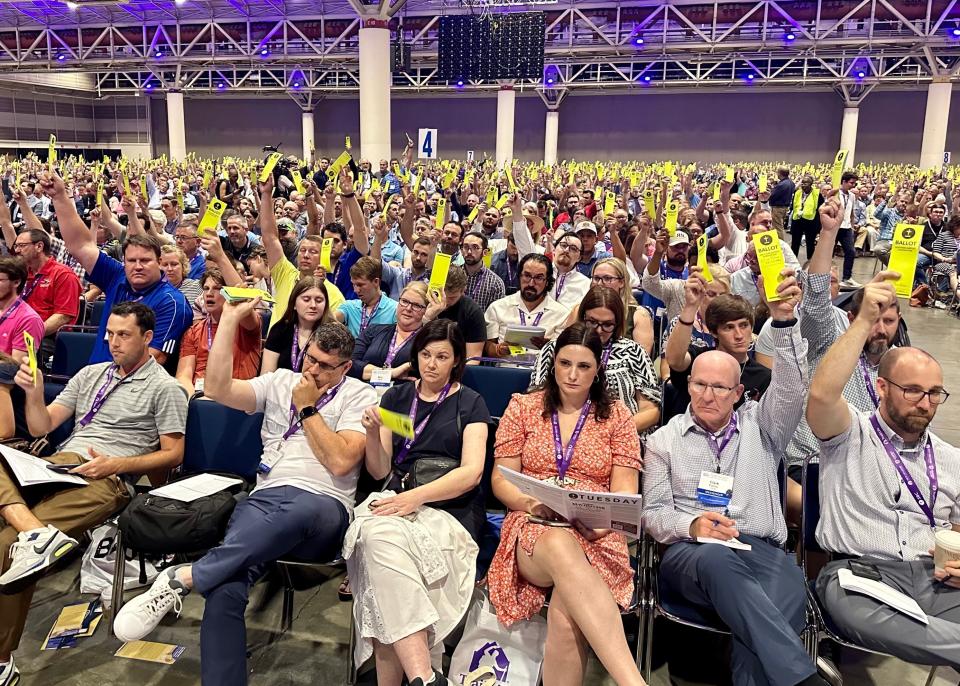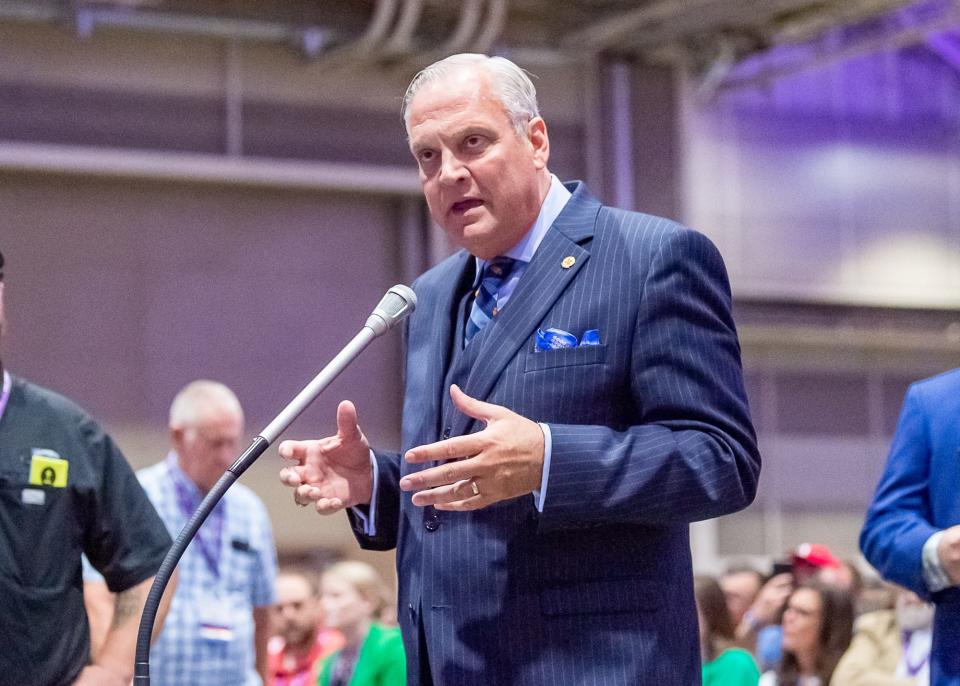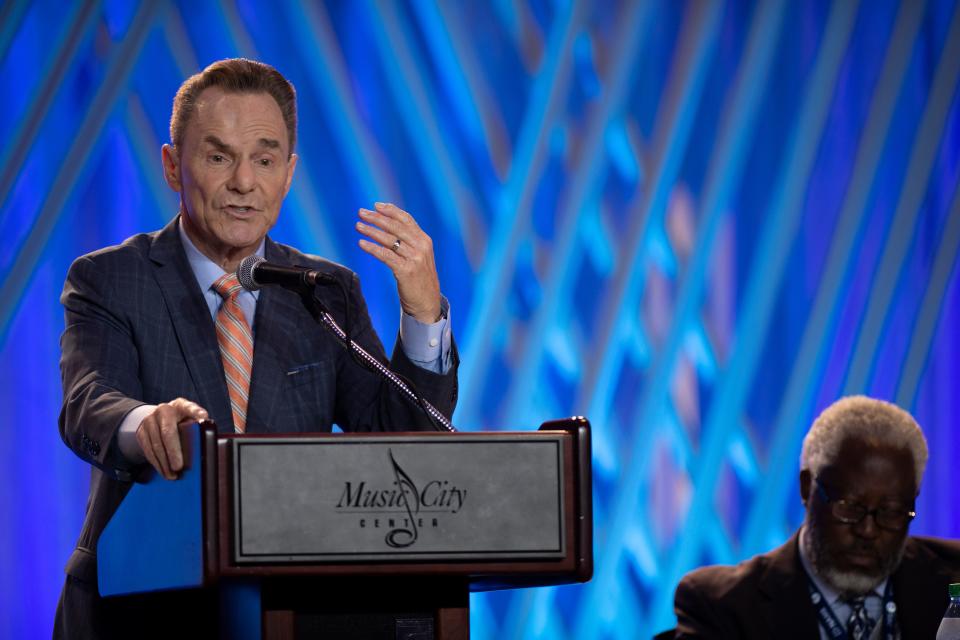Audit of past SBC renewal push forecasts 'uphill battle' to expand reach
A new white paper study found a 14-year-old Southern Baptist Convention initiative aimed at combating declining baptisms yielded little-to-no change, a disappointing outcome in what prominent Southern Baptists endorsed as a turning point for the nation’s largest Protestant denomination.
Published weeks before the SBC's annual meeting in Indianapolis, the white paper illustrates the dissonance between larger trends affecting the Nashville-based SBC and the convention’s proclaimed response to those trends. The findings raise deeper questions about political posturing by convention leaders and the responsibility of those leaders — versus that of rank-and-file Southern Baptists — to enact change.

“Just because we have a task force with very well-known men who are adept at leading churches doesn’t mean it’s been translated over to the SBC in a positive way,” said New Orleans pastor Jay Adkins. “That’s not to cast aspersions on anyone. It’s just to say some of us who talk a good game don’t always walk a good game.”
Adkins chaired the task force behind the white paper about a 2009-2010 initiative called the Great Commission Resurgence Task Force, which recommended major structural and financial changes to certain SBC-affiliated agencies, called entities. The Great Commission Resurgence Task Force wasn’t the only effort in the past couple decades that sought to better mobilize the SBC's money and manpower. But it was by far the most comprehensive and most heralded of those efforts.
Adkins’ task force found only two of the Great Commission Resurgence Task Force’s seven recommendations ever materialized. Those findings will be presented at the SBC's annual meeting on June 11.
In one takeaway, the findings by the Adkins task force evidences the overwhelming force by which declining church attendance and religious affiliation is affecting the nation’s most influential evangelical group. The SBC’s latest annual census affirmed that reality in a report last week.
“It’s always been an uphill battle, it’s going to be an uphill battle,” Adkins said. “Now, it almost feels vertical.”
Yet Adkins’ task force found the Great Commission Resurgence Task Force’s goals fell prey to other ills, some of its own making. The most clear-cut example is the proposed North American Mission Board's overhaul to empower the SBC’s domestic mission agencies to plant more churches — particularly in regions with a minimal Southern Baptist footprint. The latter goal came to fruition, but at the expense of its longstanding partnerships with certain state Southern Baptist conventions and regional associations.
The Great Commission Resurgence Task Force also recommended that the North American Mission Board dissolve its contracts with state conventions that had allowed the mission agencies to finance certain positions that might vary across different states. The dissolution of those contracts put people out of work and bred resentment among those who had less people to do similar work. In fact, this very change is at the heart of an ongoing federal lawsuit against the North American Mission Board.
“In 2010, NAMB (North American Mission Board) was bloated, lacked focus and its impact had become diluted as it tried to be all things to all people,” said NAMB President Kevin Ezell, in a statement about the Adkins task force report. “NAMB leadership knew going in that a massive transition would be painful, but it ultimately had to be done to make NAMB more strategic and a better steward of the resources entrusted to us.”
Recent and related: Southern Baptist Convention sees membership drop below 13M
Measurable change?
Many of the quantifiable measures of success of the Great Commission Resurgence Task Force continued to falter after the convention approved those seven recommendations at the SBC's annual meeting in 2010.
Baptisms still fell, new church plants couldn’t keep pace with the rate of church closures, the number of missionaries abroad lessened, and overall giving to the Cooperative Program — a denomination-wide budget that receives its income from church giving and benefits most SBC entities — decreased by 7% in the past 11 years, according to an analysis of SBC fiscal-year budget reports. These changes happened despite a boost in funding to the North American Mission Board and the International Mission Board.
The most vocal proponents of the 2010 task force don’t see the woes recently reported by the Adkins task force as an indictment on their work or the legacy of their campaign for renewal.

“My hope is Southern Baptists can recognize there is no tinkering with the machinery and there is no massive transformation of the SBC’s organization that’s going to solve problems that are far deeper,” said Al Mohler, president of Southern Baptist Theological Seminary in Louisville, in an interview about the Adkins task force’s report.
Mohler was part of a sort of dream team of statesmen and megachurch pastors who served on the Great Commission Resurgence Task Force and, by virtue of their presence, lent to the initiative’s credibility. The group also included Ronnie Floyd, who chaired the 2010 task force and later became the SBC Executive Committee's president and CEO; then-SBC President Johnny Hunt; Southeastern Baptist Theological Seminary President Danny Akin; and future SBC president J.D. Greear. The group’s 2010 report emphasized that the responsibility of implementing this renewed vision falls on all Southern Baptists, not just the task force.
“We are a convention of churches, not a convention of task forces, including ours,” Floyd said in a statement about the task force findings. “Penetrating lostness regionally, nationally, and globally is in the hands of our churches and their leaders and members.”
Transparency and trust
Perhaps the most troubling findings by the Adkins task force weren't about operational achievements, but cultural virtuousness.
In some cases, there were disparities between the behavior the 2010 task force sought to promote versus the policy changes it advocated. For example: the addition of a category of funding that accounts for church giving to the Cooperative Program and to other select fundraisers. The Adkins task force report said that new category essentially assisted megachurch pastors “so that the numerical value was more palatable when nominated to convention office or elected as an entity head.”
Also, the Great Commission Resurgence Task Force called for a reinvigorated spirit in the SBC marked by charitability and transparency.

As for the latter virtue, Adkins’ task force itself had trouble accessing certain records — 57 CDs with old Great Commission Resurgence Task Force audio recordings that Floyd donated to the Southern Baptist Historical Library and Archives with the stipulation the records would remain sealed until June 2025. Mohler, chairman of the SBC archives, told Adkins he cannot override a donor’s request and Floyd, who’s the donor in this case, said in a statement the current restrictions “cannot be reversed except by the Convention.”
Other battles over access to information, notably for a third-party inquiry into clergy abuse and SBC leaders’ response, is part of an overall “erosion of ‘trust, transparency and truth’ within our convention,” said the Adkins task force's report.
Also, some suspicion and division among Southern Baptists has intensified in the past decade, often playing out over social media, said the report. To the Adkins task force, these examples of heightened hostility and infighting among Southern Baptists is a wake-up call for “for each of us to take inventory of our own actions and attitudes, to repent if necessary.”
Liam Adams covers religion for The Tennessean. Reach him at ladams@tennessean.com or on social media @liamsadams.
This article originally appeared on Nashville Tennessean: SBC audit of 14-year-old renewal effort forecasts 'uphill battle'

